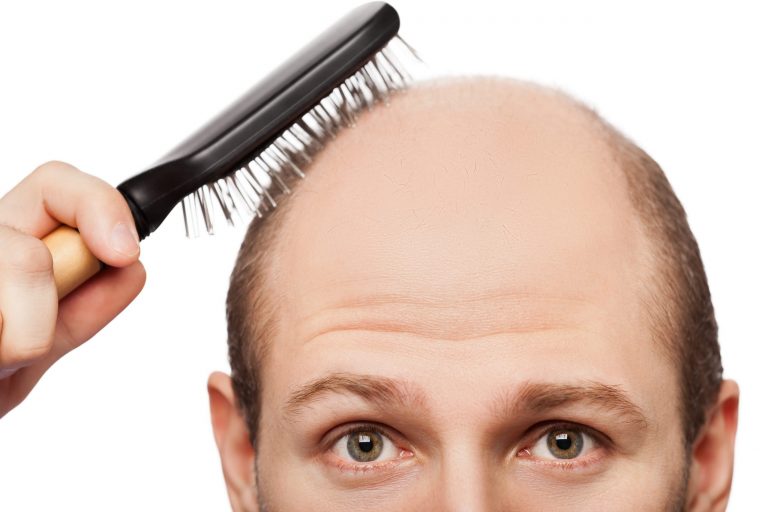
Page Contents
Male pattern baldness is a serious issue affecting millions of men all over the world. It spares no one. Both the old, the young, the rich and the poor are victims. Most people fail to recognize the effect it has on an individual’s confidence and body perception.
I’ve heard a lot of things about male baldness over the years. Most are old wives’ tales handed down over generations, while some come as “medically supported” treatments. One of the crazy things about male pattern baldness is the huge number of alleged cures. Some of these so-called treatments are unorthodox, some plausible, while others are just downright silly.
From minoxidil to onion juice to shea butter, a lot of treatments have cropped up over time. Actual scientific research and careful evaluation do back some claims, though most seem to be cooked up by middle-aged men desperately trying to figure out how to stop their hair from falling out while they deal with a mid-life crisis.
While hopefully, we’ll get to talk about some of the more possible cures and those generally accepted by the world of male haircare, our topic for today is one that has been gaining traction over the years, especially on the internet.
Today we’ll talk about ketoconazole.
What is Ketoconazole?
Ketoconazole is an antifungal agent. It’s used to treat a wide range of fungal infections, especially scalp infections. There’s rumors that it’s a miracle cure for male pattern baldness.
Sadly, there’s no concrete medical evidence that ketoconazole stops hair loss or aids in hair regrowth. Most of the so-called “evidence” on the internet are just anecdotal accounts seen mostly on amateur blogs and chat forums. Some scientific studies have proposed a link between ketoconazole and hair regrowth through its ability to disrupt dihydrotestosterone locally, but the results have been inconclusive and the link tentative at best.
What is male pattern baldness?
First, “baldness”just means an absence of hair. This can be due to a wide range of reasons which are beyond the scope of this article.
The correct term for what we commonly call baldness is actually male pattern baldness or androgenic alopecia. Genetics generally plays a major role.
There is honestly no “cure” for male pattern baldness, though certain medical treatments can slow it down and in certain cases help some individuals attain a certain amount of hair regrowth. Hair transplants have become more popular, but not everyone can afford this procedure or is willing to go under the knife, no matter how minor the procedure.
So for those looking for a one time cure for the condition, I’m sorry to say that it’s not ketoconazole.

Why is ketoconazole a miracle cure for male pattern baldness?
One of the greatest mistakes people make about medical information is that of wrongful associations. For instance, most mothers believe teething causes diarrhea and fever in infants, while these are due to normal physiological changes that occur in most children around that age which has nothing to do with teething.
Is it hype? What’s going on here? Asides from invented stories which were probably being touted for profit, some people may have honestly noticed hair regrowth while using it.
There’s probably a few explanations. They’d include things like:
They actually had a condition called alopecia areata
Some people never had androgenic alopecia in the first place. They had a less common but also an important condition called alopecia areata. This is an autoimmune condition that causes hair to fall off in patches. Most cases of alopecia resolve spontaneously.
So while the person in question is trying ten different hair loss “treatments” all at once the condition resolves. This then leads him to believe one of the products is a “miracle cure for baldness”.
Seborrheic dermatitis and tinea capitis
Sometimes severe cases of seborrheic dermatitis and dandruff can actually lead to hair loss. Excessive itching and hair-pulling eases discomfort for some, though.
Ringworm or tinea capitis also causes hair loss. Though it’s more distinctive and easily recognizable, it may still be mistaken for male pattern baldness.
So you are probably thinking “what does this have to do with ketoconazole?”.
Then you will probably be interested to know that both of these conditions are actually fungal infections. Individuals with this condition may buy ketoconazole shampoo over the counter in a bid to cure their “baldness” and end up accidentally curing the underlying condition, leading to hair regrowth.
So please don’t waste time, money and effort on rumored cures that don’t work and may actually affect your health.
There are medically approved treatments for androgenic alopecia. Some are minoxidil, 5-alpha reductase inhibitors like finasteride and others. Look into those and stay away from online tales about “the miracle cure for baldness that gives results in one week”. At best they don’t work, at worst they could leave you in a much worse situation than before.
Does Ketoconazole Stop Hair Loss?
Even though there is no sufficient scientific research to back up the claim that Ketoconazole is effective in the prevention of hair loss compared to finasteride and minoxidil, some studies on Ketoconazole and baldness suggest that it can improve hair growth.
A 1998 study that compared minoxidil and Ketoconazole in terms of which one best encourages hair growth showed that anagen hair follicles were increased in size and proportion by applying 2% of Ketoconazole at a similar rate to the application of minoxidil spray.
Also, there are animal studies that showed that the regular use of Ketoconazole could significantly improve hair growth on animals, even in areas where balding has affected their hair follicles.
Currently, there are not enough data to buttress the point that Ketoconazole effectively regrows hair or treats baldness.
However, some scientific evidence suggests that when people use the shampoo form of Ketoconazole, they record measurable improvement in their hair growth journey.
How Does Ketoconazole Help Stop Hair Loss?
While the available scientific evidence shows that Ketoconazole can significantly stimulate hair growth, it is still inconclusive about how and why it does this.
The major cause of male pattern baldness is dihydrotestosterone or DHT, a chemical agent that affects men’s hair follicles, especially those prone to genetic baldness. If dihydrotestosterone is not treated on time, it can make hair follicles to stop producing new hairs.
Hair treatment solution like finasteride is effective in the treatment of DHT. It prevents the formation of DHT and thus stops any damage to hair follicles. However, there is limited scientific evidence that the use of Ketoconazole can effectively function like finasteride.
A 2004 scientific paper presented a hypothesis that the use of Ketoconazole can actually disrupt the formation of DHT; thus slowing down hair loss.
The researchers even went on to assert that Ketoconazole can serve as an alternative to finasteride for the treatment of hair loss.
Related Reading
Ketoconazole Shampoo Can Also Prevent Dandruff
Whenever you notice dandruff forming either on your shoulders or neck, you won’t go wrong adding Ketoconazole in your hair care stack.In addition, if you want to grow a fuller and thicker hair, you may also consider giving this product serious consideration. Ketoconazole works for both men and women and does not have any noticeable side effects.
How to Use Ketoconazole Shampoo for Hair Growth
For the best result, apply Ketoconazole shampoo for at least 3 to 4 times a week. It would help you minimizes the dryness and irritation that you often experience on your scalp.
After every shower, ensure you use a quality conditioner, at least the one infused with oils such as coconut, argan or jojoba. Doing this will help to protect your scalp and hair
If you want to make Ketoconazole more effective, you may consider applying it with minoxidil. Several studies have shown that minoxidil, a vasodilator medicine not only treat high blood pressure but can also be helpful in the treatment of hair loss.
In addition, it is widely believed that combining minoxidil with other hair loss solutions like Ketoconazole works better.
When you use Ketoconazole alongside powerful DHT blocker like minoxidil, it would not only prevent hair loss, it would also make your hair fuller and thicker.
This means that using this dual solution would be a no-brainer if you’re keen on achieving the best results within the shortest possible time.
Tired of chasing down hair growth solutions without the results you’re after? Make sure you’re using the 3 hair loss products known to work before experimenting with alternative solutions – you may be surprised with how effective those 3 alone can be.






